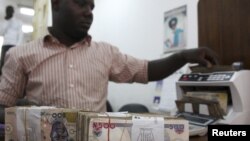ABUJA —
Early next year Nigeria will introduce a 5,000 Naira bill, worth just over $30, and introduce coins to the economy. Officials say the move will save the country millions of dollars but some analysts say the larger bills will increase corruption.
Modern countries need coins, says the Central Bank of Nigeria. The bank is revamping its currency to keep up with the times. Director of Corporate Communications, Ugo Okoroafor says Nigeria is moving into a new era.
“Let’s not look at Nigeria now," he said."We are moving into a society where there will be vending machines. There are parking meters that are coming up. The rail lines are coming back to life. These are areas where coins are very important.”
Modern countries also need less cash, he says, and the new 5,000 Naira bill, worth $31.60, will mean fewer bills in circulation, saving Nigeria millions of dollars a year in transport, storage and management of cash. Currently the highest currency denomination is 1,000 Naira.
But not everyone agrees. In the past week, politicians, columnists and other critics have railed against the bank, saying the 5,000 Naira note will increase inflation and encourage corruption and money laundering. With the larger denominations available, cash can literally be moved five times faster, making it easier to steal or hide large quantities.
Earlier this year, the legislature compiled a report showing that $6.8 billion worth of Nigerian public funds had been stolen by oil moguls and corrupt officials between 2009 and 2011.
Clement Nwankwo, the executive director of the Policy and Legal Advocacy Center in Abuja, says with larger denominations available, people will also be less likely to be interested in the government’s “cash-less” economy initiatives, meant to strengthen Nigeria’s economy.
“I think it’s a very bad idea," said Nwankwo. "I have no idea how you can be seeking to promote a cash-less economy and creating currencies of higher denominations and hoping that this tackles it. What you do with higher denominations is you promote a cash-full economy.”
Other analysts say the new currency may not alter inflation or promote corruption, pointing out that big-time swindles in Nigeria are often carried out in dollars, not Naira.
Modern countries need coins, says the Central Bank of Nigeria. The bank is revamping its currency to keep up with the times. Director of Corporate Communications, Ugo Okoroafor says Nigeria is moving into a new era.
“Let’s not look at Nigeria now," he said."We are moving into a society where there will be vending machines. There are parking meters that are coming up. The rail lines are coming back to life. These are areas where coins are very important.”
Modern countries also need less cash, he says, and the new 5,000 Naira bill, worth $31.60, will mean fewer bills in circulation, saving Nigeria millions of dollars a year in transport, storage and management of cash. Currently the highest currency denomination is 1,000 Naira.
But not everyone agrees. In the past week, politicians, columnists and other critics have railed against the bank, saying the 5,000 Naira note will increase inflation and encourage corruption and money laundering. With the larger denominations available, cash can literally be moved five times faster, making it easier to steal or hide large quantities.
Earlier this year, the legislature compiled a report showing that $6.8 billion worth of Nigerian public funds had been stolen by oil moguls and corrupt officials between 2009 and 2011.
Clement Nwankwo, the executive director of the Policy and Legal Advocacy Center in Abuja, says with larger denominations available, people will also be less likely to be interested in the government’s “cash-less” economy initiatives, meant to strengthen Nigeria’s economy.
“I think it’s a very bad idea," said Nwankwo. "I have no idea how you can be seeking to promote a cash-less economy and creating currencies of higher denominations and hoping that this tackles it. What you do with higher denominations is you promote a cash-full economy.”
Other analysts say the new currency may not alter inflation or promote corruption, pointing out that big-time swindles in Nigeria are often carried out in dollars, not Naira.





